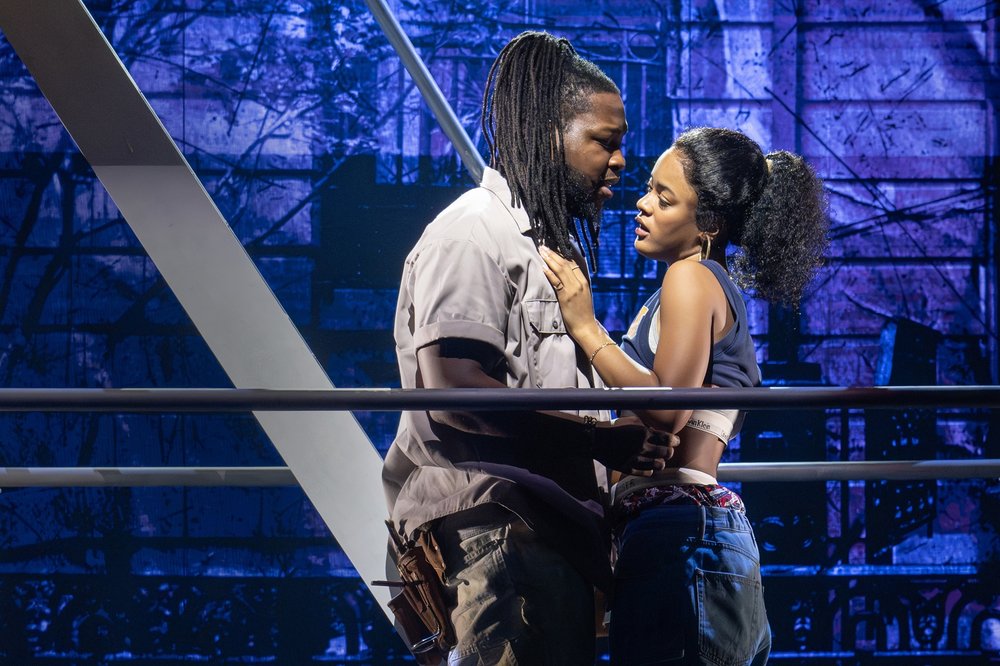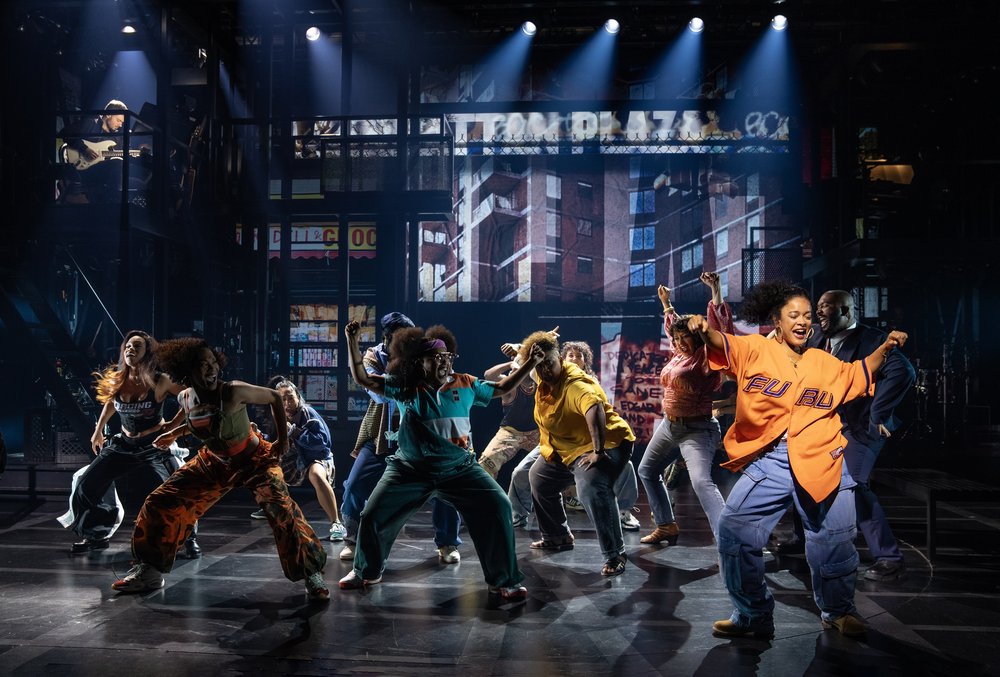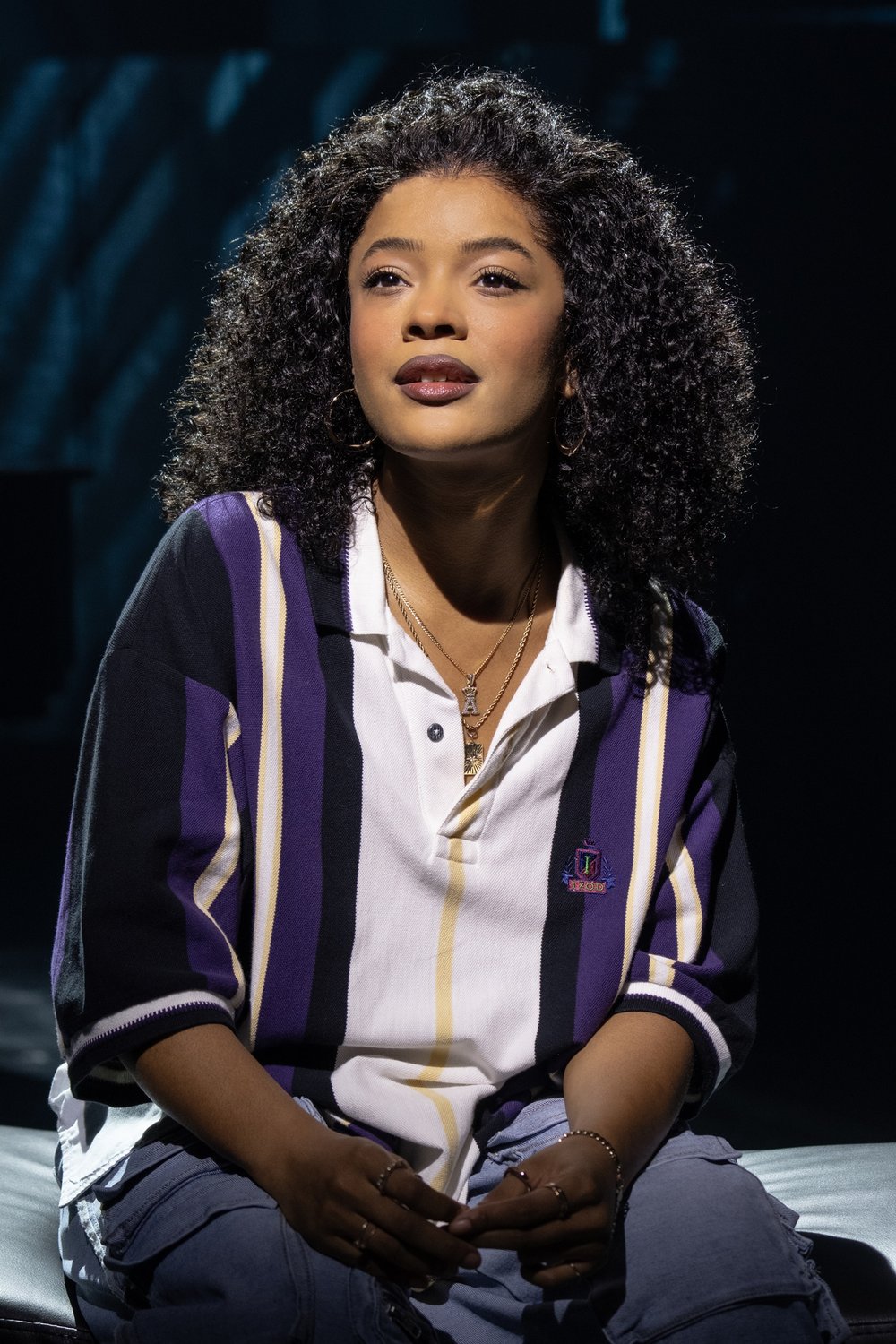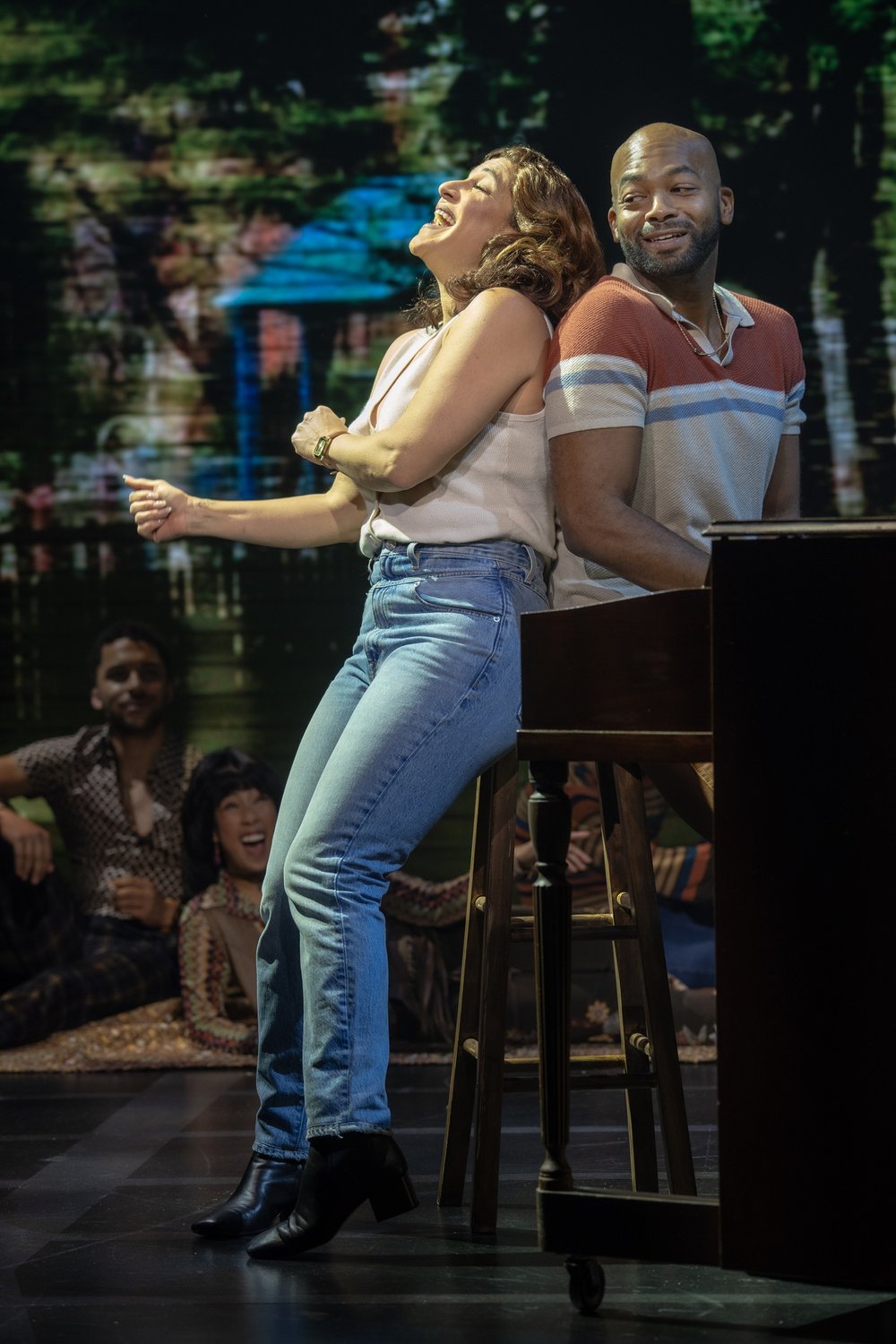A look at ‘Hell’s Kitchen,' the Public Theater's new musical inspired by Alicia Keys
Nov. 18, 2023, 6:01 a.m.
An interview with the creative team behind the musical inspired by Alicia Keys' life.

Hell's Kitchen, the new musical based on Alicia Keys, is reportedly the most expensive musical production ever staged at the Public Theater.
Using Keys’ discography, as well as originals she composed for the show, it's the story of Ali, a biracial 17 year-old girl living in a Hell's Kitchen highrise with her mother, who works nights to keep them afloat.
Mom tells her to stay put when she leaves for work, but Ali has other ideas, including spending time with her crush, Knuck, a painter who plays the bucket drums when he’s off work. When mom finds out and the cops show up, things get bad.
Ali finds refuge with a neighbor, concert pianist Miss Liza Jane, who becomes her stern but loving teacher and imparts some real life lessons.

Ultimately, the show is a love story, but not between Ali and Knuck – it’s between a daughter and her mother.
Hell's Kitchen is currently in previews and opens Sunday, Nov. 19, and runs through Jan. 14.
WNYC’s Alison Stewart talked to the creative team behind the show: writer Kristoffer Diaz, director Michael Greif, and musical supervisor Adam Blackstone, who is also Alicia's longtime collaborator.
Below is an edited version of that conversation; you can listen to the whole discussion here.
Alison Stewart: Adam, I'm going to start with you. You wrote on Instagram that you and Alicia have been cooking up this musical for more than a decade. What do you remember about the original conversations about the idea?
Adam Blackstone: Ironically, my son is 8 years old. I got a FaceTime in the middle of a scoring session for this – that my wife was going into labor.
And I took an Uber from New York City all the way down to Delaware to watch my son be born – thank God, healthily. I literally have been working on this all of his life.
In the early stages, I remember she was very adamant about telling a story through her music. And so, the first thing that we did was sit down, get her whole catalog in front of us, sat on two pianos. I remember it like it was yesterday.

I just asked questions like: What were you thinking when you wrote this song? What was the storyline? Who was it about? How can we relate this to everyday life today, and intertwine it with a story that can be told about New York City?
Michael, you've directed “Rent,” “Dear Evan Hansen” and “Next to Normal,” one of my favorites. What was something that you got to do as a director with this show that was new for you?
Michael Greif: I think one of the most exciting parts of this whole process for me has been getting to work with Camille Brown, our choreographer. The physical vocabulary of the piece is so explosive and so joyous. And I haven't gotten to work with an ensemble of dancers and really imagine how to tell a story through the vitality and energy of dance, in a long time.
Camille is the most extraordinary collaborator. She's so smart about story and so smart about what points she wants to make through physical storytelling.
Kris, how did you get involved with the project?
Kristoffer Diaz: Alicia had an idea 12 years ago that she wanted to do this project. And I believe she went over to the folks at WME, my representation, and interviewed a few folks. And we had a meeting down in a wine cellar.
It was me and her and sitting around the table with a bunch of people and it was very intimidating. But very quickly, we just started talking about 1990s hip-hop, and we grew up on the same stuff.

We hit it off right away and then spent a long, long, long, long time figuring out how to actually turn it into a story that wasn't just “This is Alicia Keys life.”
She did not want to do a biopic, the retrospective of an amazing artist, because she's in the middle of her career. She's still making hit after hit after hit. So we wanted to focus on a really specific small moment in her life. I think we did that.
Michael, what was something she shared with you about her life that helped you do your work?
Greif: Well, she introduced me to her mother, so that had a real impact. In the very first meeting I had with Kris and with Alicia, we talked about what we really thought the spine of the musical was and talked about it being a love story between this daughter and her mother.
The actress who plays Ali is brand new to professional theater. Tell us how you found her.
Greif: The fantastic casting department at the Public Theater! This production was led by Heidi Griffiths. We got a whole lot of submissions, and we first saw Maleah Joi Moon on a tape submission. I think they might have even found her on YouTube or Instagram. I don't really remember that sequence.
She was among a group of really talented young women who wanted to play this part. We saw some really great women – And yet Maleah very clearly stood out at that pack. I remember both Adam and Alicia immediately just pointing to Maleah and saying, “That's how we start.”
Blackstone: Immediately!
What do you need to do as a director to help someone who is brand new?
Greif: I love that job. It's about giving that person a whole lot of confidence. It’s mostly me being open to what her instincts are telling her and really letting Maleah follow through what she feels is the right thing to do.
Alicia is also spectacular working with young talent, which I think everyone in our company will tell you and what enormous impacts they've had.
Adam, what do you hear in Maleah Joi Moon's voice that's unique?
Blackstone: It is deceivingly hard to sing Alicia Keys' music. I think we all can say that in the shower, we sound great singing “Fallin” and “Teenage Love Affair” and “If I Ain't Got You.”
But when you're put on that stage, you see where the key sits. You see the intervals that she hits live and there's only one Alicia Keys.
When Maleah walked in, as Kris mentioned, the presence embodied a young girl living in Hell's Kitchen. And then she opened her mouth and immediately I saw that her ability with her voice was limitless. She has a break to her falsetto from chest voice that is flawless.
She has the ability to move and dance without losing clarity and volume in her voice. And she has the ability, as you will see, to emote while still bringing the song across in a very heartfelt way – no matter what that is – whether it's happy, sad, funny, flirty, sexy or serious.
It’s hard to do that for any type of vocalist and she has the ability to do it all.
Chris Lee plays the young man Knuck. He’s the young man she’s got a big crush on. He’s a painter by day, he plays the bucket drums on the side with his friends. an interesting character. I appreciated it. I took my 15-year-old son to see it. He's like, “That's deep. That's dope, Mom.” And I want to know what adjectives you would use to describe Knuck.
Diaz: The fun thing that we always think about with Knuck is what adjectives other people would use to describe him.
We always wanted to write characters that were unexpected and multidimensional. Growing up in the 90s, listening to hip-hop in that era, there was so much of a push towards being hard.
Especially living in New York City, it was all about being tough and gangster and I know so many people who – especially in the ‘90s – either gave that impression or just were judged as such.
Very early on, we're like, “It's somebody who looks like that, who can be that, who can present that. And then be able to peel the layers away.”
Because he's a big guy. He's strong. He's dark skinned. He's got braids …
Diaz: … he's hanging out outside of her building and the cops are around and the doorman is afraid. Part of what she's attracted to is that he's scary and sexy.
And then to have that reveal of, “No, I'm just a guy going through my life and I'm butting up against that.”
Chris Lee, who plays Knuck, has been part of this production for a very long time and he brings that vulnerable sensitivity with him every step of the way. He's a family man. He's so good with his kids. He's all the stuff – and you just know that some people have that perception of him.
So we wanted to really play against type in as many ways as possible, especially when he's gonna be getting up there and singing those beautiful, soft, sensitive love songs.
There's a pianist in the piece, Miss Liza Jane. She is a Black lady of a certain age then has a certain countenance to her. We've all met a Miss Liza Jane, and she really turns out to be an important person in Ali’s life. Adam, did you have a Miss Liza Jane in your life?
Blackstone: I did. His name was Mr. Blackstone.
My father was that strong figure for me, specifically on the piano. If we want to make it gender specific, I’d have to say my mother and my grandmother and my aunties, who were all from church and did not play. I remember my aunt Betty was one of the first ones to cultivate my talent.
She was the choir director at our family church, where we were local-famous, which means on our street, everybody knew who we were. And it was because of the music for sure.
And then that spread out into the town of Trenton, New Jersey. And then the wings of New Jersey. My auntie was like, “You're going to be great. There's no ifs, ands or buts about it. This is what we do. You represent our name, but also you represent yourself when you step out into the world.”
So for me, being a young African American man, being cultivated by these strong Black figures, men and women, who told me I was great very, very early when I stepped out into – I'm using air quotes – the real world.
And I saw that that bubble that I was in was not necessarily what society and what the world was. I already had a sense of greatness. I already had a sense instilled in me of integrity and of humility, and it let me go on to do the things that I manifested and set forth.
And I think that Miss Liza Jane encourages Ali throughout this entire show to go and be great and do the same.
Michael, did you have a Miss Liza Jane?
Greif: I had a piano teacher named Mrs. Bacher, but she didn't loom very large in my life, I'm afraid.
Who was the person though, who, who really encouraged you?
Greif: Well, like Adam, you take a lot of love and support from your family. And my mother, my grandmother, my sisters … they were all very, very, very important to me becoming the person I am now.
Kris, how about you?
Diaz: Oh, man. There's a few, but I will say my parents as well. My mom was the one who got me into theater and pushed me that way. My dad was not into it, but my dad talked me out of going to business school and basically talked me into theater school for lots of reasons.
He basically was like, “I don't think you really care about that business side of things. And we're not in a position that you have to pull the family. We're trying to do that already and we want you to go and make a name for yourself or not make a name for yourself, but find the thing that brings you to happiness, brings you to success.”
I don't know where this enlightened conversation came from both of my parents at that point.
We're bringing them to opening night on Sunday. They've seen bits and pieces of the show, but I don't think they know all the things that are coming and how much of a love song to Alicia's mom and in many, many ways – I think for all of us – whether that's the Miss Liza Jane character or the parent character in our lives where there's a, there's a lot of love and joy and gratitude baked in.